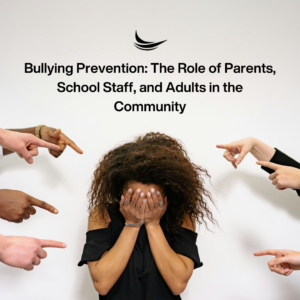Bullying Prevention: The Role of Parents, School Staff, and Adults in the Community
 Many students, especially older youth don’t tell adults about being bullied while struggling with their mental health in silence. It can be difficult for children who are victims of bullying to speak up due to the inherent power dynamics and strong emotions such as emotions such as shame, fear, and powerlessness. Bullying is common and the facts about bullying in the US are alarming, prompting action needed among adults. Bullying is among the top concerns for parents, especially related to worries about their child struggling with anxiety, depression, and the fear of suicide.
Many students, especially older youth don’t tell adults about being bullied while struggling with their mental health in silence. It can be difficult for children who are victims of bullying to speak up due to the inherent power dynamics and strong emotions such as emotions such as shame, fear, and powerlessness. Bullying is common and the facts about bullying in the US are alarming, prompting action needed among adults. Bullying is among the top concerns for parents, especially related to worries about their child struggling with anxiety, depression, and the fear of suicide.
Bullying is “a form of aggressive behavior in which someone intentionally and repeatedly causes another person injury or discomfort.” Bullying can be physical, verbal, or electronic (e.g., through online chats, emails, and social networking sites). Bullying includes threats, behaviors such as physical assault, and intimidation.
If, how, and when an adult responds to reports of a child’s concerns of being bullied communicates a strong message. When adults respond to bullying consistently and promptly, this can help stop bullying behavior over time. Prevention on the spot is key. Let’s look at action steps that parents, school staff, and adults in the community can take together to help promote the physical and emotional well-being of children.
Provide timely and consistent responses.
Stopbullying.gov offers specific things to do, in this area along with common mistakes to avoid.
- Intervene immediately. It is ok to get another adult to help.
- Separate the kids involved and make sure everyone is safe.
- Meet any immediate medical or mental health needs.
- Stay calm. Reassure the kids involved, including bystanders.
- Model respectful behavior when you intervene.
Avoid these common mistakes: Don’t ignore bullying or think kids can work it out without adult help.
- Don’t immediately try to sort out the facts or force other kids to say publicly what they saw.
- Don’t question the children involved in front of other kids or talk to the kids involved together.
- Don’t make the kids involved apologize or patch up relations on the spot.
It is important to note that additional support from emergency responders and medical professionals is needed when there are serious threats of physical injury or hate-motivated violence (e.g. racism, homophobia), there is sexual abuse, serious bodily harm, a weapon is involved, or there are accusations of illegal activities.
Talk about bullying and bullying prevention.
When parents, school staff, and adults in the community talk about bullying and bullying prevention, it raises awareness of the issues and helps to build understanding. The focus on bullying prevention helps promote kind and prosocial behaviors within the school environment such as inclusion and acceptance of all students. Talking about bullying helps communicate that it is OK for children to speak up and that their concerns matter and will be taken seriously.
Work together to build a safe school environment.
Every child has the right to feel safe and supported, and it is the responsibility of adults, including parents, school staff, and adults in the community to ensure physical and emotional safety. Families are encouraged to partner with teachers and schools and work together on strategies to help create safety within the school environment. Those who work with children such as therapists can help coordinate care with school staff and share resources and recommendations.
Create community-wide bullying prevention strategies.
Adults can help support bullying prevention legislation and bullying prevention policies. It is important to spread the word as part of bullying prevention as everyone has a role to play. Having dialogue and sharing information and resources within the greater community helps unite efforts among adults.
When everyone takes action that is timely and consistent, works together to raise awareness, builds a safe school environment, and creates community-wide bullying prevention strategies, the unified efforts make a huge impact on children’s well-being.
Written By: Charlotte Johnson, MA, LPCC



























